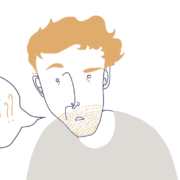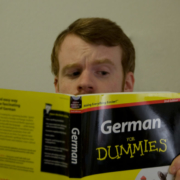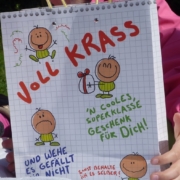Small vademecum to handle German without performance anxiety
Let’s start with a basic assumption, which to the ear of many will sound redundant: German is a difficult language. Fascinating, mysterious and that gives lots of satisfaction if handled with the same audacity and wonder of the first explorer of an ancient Khmer temple. But notoriously, irremediably and damnly complicated. For their own admission, Germans often love to repeat amongst themselves “Deutsche Sprache, schwere Sprache” (“German language, difficult language”), alluding to the challenges and idiosyncrasies that one of the most spoken mother tongues of Europe poses. Not to a German speaker, ça va sans dire, that he will almost certainly have learned to spell “Uberraschung” even before the word “Mom”. The problem arises when a foreigner, with greater or lesser goodwill, approaches the arcane and often indecipherable complexity of this idiom – an idiom extremely logical, schematic and intuitive for some, too obscure and deterrent for others.
Perhaps this is due to the fact that German, like other Indo-European languages, has both fusional and agglutinative traits. Which are not strange food intolerances or incurable diseases, but large containers where languages are organized in lists and classified according to morphological phenomena that have led to the formation of words over time. The difficulty in learning German is that in some ways it is a language that tends to flex (the grammatical cases and the declination of nouns and adjectives are a clear example) and at times tends to condense (see words of disproportionate length, formed by the addition of prefixes and suffixes to a lexical or verbal root). If we add to this the unclear identification of the gender, the fact that the conjugated verb or the participle – hence the key of everything – are placed very often after a forest of complements and at the end of a kilometer long sentence, the presence of a hostile and multifunctional auxiliary as werden and not to mention the use of at least five different mechanisms for the formation of plural names… well, it is not surprise if the beginner’s reaction will be one of outmost panic.

Don’t despair, and most importantly don’t give up, if at the restaurant you will be facing three objects that can be associated to three different grammatical genders on the same table: der Löffel (the spoon, masculine), das Messer (the knife, neutral) and die Gabel (the fork, feminine). The first instinct will be probably be to want to throw the table in the air, scream at the waiter whilst emitting undignified sounds and run as far as possible from so much linguistic confusion. But it is not by running away that you will be able to solve the problem. If you really want to feel like the master of your own destiny and of your future communications in the teutonic land, you will simply need to change your approach to a language that is not that harsh after all. So no more feeling lost, aspiring Germanophones, and keep in mind that:
– There is no obstacle that constant studying can’t overcome
Studying, studying, studying. Whoever has arrived to Berlin, or in Germany at broad, with a linguistic repertoire limited to a guten Morgen and Dankeschön will better look for a school or a valid method to approach this language seriously. In Germany there is a classification of learning levels (based on the Common European Framework of Reference for Languages) starting from the A1, the basic step, and arriving at C2, the highest level, which presupposes an excellent mastery of the language. The achievement of each level implies the frequency of two intermediate modules: the A1 level, for example, is achieved with the frequency of A1.1 and A1.2. A constant study of the language implies that to the 100 hours of frontal lesson for each module, at least as many hours should be dedicated to an individual study, following the debatable advice of learning and memorizing at least 10 new words per day. If math is not an opinion then this brings us to the conclusion that to reach a discreet language level which can be considered the B1 it is necessary to dedicate at least 1.200 hours of sweat and tears. There is no other way, it is the only investment possible to achieve satisfactory results. A very popular but improbable motto says that life is too short to learn German. I am more inclined to believe that those who are convinced that they can go without studying German have a short life in Germany.
– The spelling and pronunciation of German can be quite intuitive
Unlike other languages like French, and apart from a few phonemes and diphthongs that can be easily memorized, German is read as it is written. And this makes it easier to pronounce it and spell it correctly. When the constructs will seem too difficult and the adjective declination will make you panic, you can always refresh your self-esteem on the basis of phonetic progress. It will be the first conquest in your climb over the legendary teutonic giant, and will also support you through dark times. Of course, these are also the first, tragic telephone conversations in German, a topic that deserves a post for its own.
– Verbal times have a much simpler use than Romance languages
In German it is absolutely normal to use the present time to express a future action, so that a phrase like “Tomorrow I will go to the theater” is a grammatically correct statement and also accepted in the written use. In addition, in the majority of Germany, but actually at the south of the so-called Weißwurstäquator (the imaginary equatorial of the white sausage marked well on the Danube path), 99% of speakers prefer the use of the Präteritum / remote past than the Perfekt / past, since it easier to memorize. Try to make a confrontation with the endless sequel of Italian, French, and Spanish verbal times, and then we can talk about it.
– There is an underlying logic and you can see it
All German nouns are written in uppercase: even Mark Twain, in his disheartening attack on the astrusive German language , was forced to admit that it was a good idea. In German there is a strict and stringent logic; once the verb prefixes are learned, at least in 60% of the occurrences, it will be incredibly easy to understand the meaning. When you will assemble genres and cases, be certain that you will almost certainly feel the concreteness and pragmatic nature of this language. Legend has it that the old (and rather unfair) stereotype of Germans who are devoid of any sense of humor arises precisely from the exaggerated precision of German language. But do you want to deny the dragging hilarity of a straightforward and unequivocal expression like “das kannst du deiner Oma erzählen” or “Go tell your grandmother?”. Germans do not need subtle hints: they go straight to the point.
-Playing with words and neologisms
The tendency to agglutinate that we aforementioned (which is also the primary cause of panic attacks registered on German soil, especially among foreign speakers, when confronted with innocuous words such as Elektrizitätswirtschaftsorganzingswirtschaftsorganisationsgesetz) can actually become a weapon to exploit to your benefit. Do not be overwhelmed by the number of letters! If you really want to apply an arithmetic approach to the language, divide the long word into its individual components, sum up their meanings until you get the overall one, subtract the anxiety and multiply the satisfaction of having understood without too much effort the sense of those forty-four letters. Not to mention that if your limited knowledge of German prevents you from completely expressing a concept, you will always be able to coin a new words without being treated as a crazy person but more as a great innovator and original language experimenter.

– Get germanized
The internet universe now offers the most complete and fun platforms that can help you integrate to your conventional and on-paper study of German some very efficient methodology. But above all it integrates a fundamental component: the entertainment. Amongst the various sites consulted during study hours and after scrolling the numerous tutorial or pseudo-educational proposals on YouTube, I’ve found and continue to find a lot of fun Get Germanized, the channel designed and created by Dominik Hannekum, present and active daily also on Facebook and on Twitter. Through a very direct and informal approach the channel becomes a sort of navigator that helps beginners to navigate among the difficulties of the basic German grammar. By deciphering the lexical curiosity of the slang, the most entertaining approaches that you may listen to in a club in Berlin, proverbs, untranslatable words, the small obsessions and thousands of other cultural nuances that are absent from the aseptic study of an idiom. It is absolutely advice to dispel with a smile the dreadful and unjustified fame of a labyrinthine language, that can prove to become incredibly fascinating.
This short account does not claim to be exhaustive or universal, but only aims to introduce you with a bit of more optimism to your descent into the Hochdeutsch. Each expedition might seem impossible at the beginning, and you are a small explorer setting off to discover a linguistic and mythological treasure. So arm yourself with courage, a good dose of initiative and remember that … “Mit Geduld schafft man alles,” with patience you win everything.
Nothing left to say than to wish you for a good trip.
And if you are living in Berlin and looking for a well taught German course, look no further can check out the classes offered at Berlino Schule here!








 Photo © slideshare.net
Photo © slideshare.net




 Photo © deutschlernenblog.de
Photo © deutschlernenblog.de Photo © YouTube
Photo © YouTube











